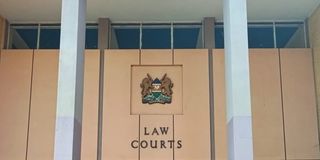Giza Ziwani: What happens to fishermen when arrested for illegal fishing in Lake Nakuru?

Entrance to the Nakuru law courts.
John Muya 41, an experienced fisherman’s first attempt to fish at lake Nakuru National park earned him a prison term before he was rescued by his family.
He had decided to try his luck in Nakuru after fish in his usual location at lake Naivasha went down.
His friend called him to Nakuru where fishing was booming though declared by the government illegal.
“It was on February 22 when I arrived in Nakuru and went straight to my friend's area of operation at Naishi area in Njoro,” Muya recalls.
At dusk he, alongside his friend, joined a group of about 20 fishermen to go to the lake to try out their luck in fishing. Little did they know the Kenya Wildlife Service (KWS) officers had set up an ambush on them.
As they were about to enter the lake, the officers emerged and every one scampered for safety.
“I was new in the area and so I did not know the routes. My friend managed to escape but got injured in the process after he fell into a ditch and twisted his ankle,” Muya says.
He, alongside another fisherman who was arrested, spent the weekend at the Naishi Police station cells before they were produced in court on Monday.
They were charged with two counts relating to illegal fishing and trespassing in the protected Lake Nakuru National park. They pleaded guilty.
Senior resident Magistrate Ruth Kefa passed his judgement handing them a prison sentence of nine months or pay a fine of sh 25,000.
As Muya could not raise the money, he was immediately thrown into the Nakuru GK prison.
His family learnt of his incarceration two weeks later before they mobilized the funds to free him from the prison.
“It was tough for me as I had left my wife and family back home in Naivasha without food. I was also shocked to meet some fishermen serving long prison terms after they failed to raise the hefty fines imposed by the courts,” says Muya.
He indicates that some inmates were serving a four-year sentence with an alternative fine of Sh 400,000 after they were found guilty of committing crimes relating to fishing in lake Nakuru.
Mtaa Wangu has established that Muya is just one among the many residents in Nakuru who have had to face the brutal force of the law for engaging in fishing activities at Lake Nakuru.
Alex, who is one of the fishermen in Kivumbini, narrates that the hundreds of youth are deemed to have disappeared yet they are serving prison terms.
“Here you may see a person going missing for months only to return after serving their terms. Since we fish at night, you might not be able to tell whether one has been arrested or attacked by a wild animal,” says Alex.
According to the lake Nakuru National park officer In charge Gideon Kebati, individuals arrested in the lake are likely to face several counts including entering and residing in a national park without authorization, conveying into a protected area snares trap or similar device contrary to Section 102 of the Wildlife Conservation and Management Act.

A photo of Lake Nakuru Park Incharge Gideon Kebati.
They may also face a charge of carrying out extractive activity in a protected area.
Kebati noted that the offences used to attract fines amounting to Sh 200,000 or two years in default but currently the punishment was reduced.
“The fines used to be up to Sh 200,000 and in default serve two years in prison. However, the punishment has come down to Sh 15,000 fine or two months in default,” says Kebati.
Lawyer Abuya Mogendi points out that the government needs to handle the issue with care as it is unfair to block people from fishing without giving them an alternative source of income.

Abuya Mogendi an advocate , during an interview with Mtaa Wangu in his office on March 28,2025.
He regretted that people are arrested and charged before courts on a regular basis yet fishing has not stopped
“Arresting people and giving them heavy punishments will not deter them from going back to fish. This is because these people are hungry and have no other sources of income. Banning fishing is like expecting them to abide by the law even when they know they are starving,” says Mogendi.
He however argues that the KWS is the enabler of the illegal fishing since they collude with fishermen to pay bribes for protection while arresting those who are unable to.
“Fishing around lake Nakuru is very lucrative and the KWS are the enablers. They benefit from bribes and sometimes sell the fish which they nab from the fishermen.


